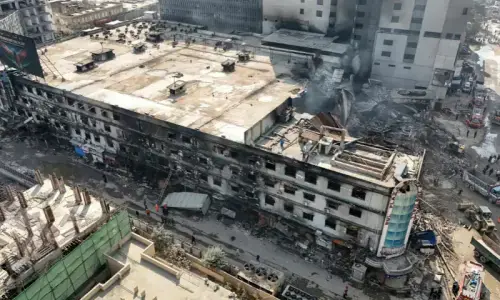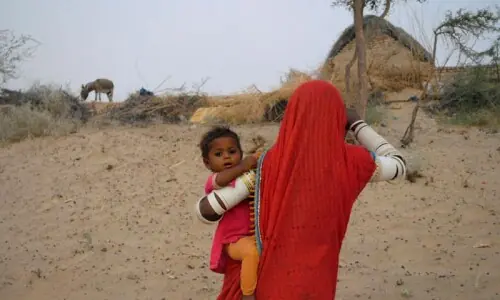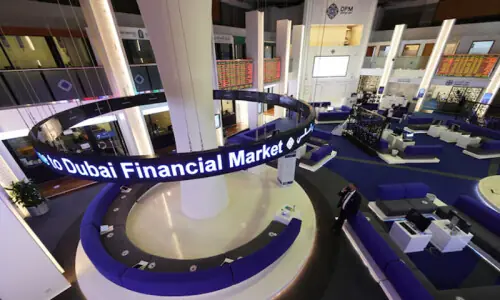KARACHI: Rich tributes were paid to the martyred workers of the labour movement of the early 1970s as the Pakistan Institute of Labour Education and Research (Piler) observed its anniversary by organising a seminar at PMA House on Tuesday.
The movement that took place in the Sindh Industrial Trading Estate (SITE) area here saw at least six workers losing lives while upholding their rights.
The movement against the forced removal of workers, the negative attitude of mill owners and anti-worker policies of the government commenced in December 1971 and continued till June, 1972. On June 7, 1972, workers were protesting against the removal of their colleagues outside Feroz Textile Mills in SITE area when the local police opened fire on them in a bid to disperse the workers. As a result one leader of the alliance of the workers of SITE industrial area, Muttahida Mazdoor Federation, Shoaib, was killed. Next day on June 8, a large number of labourers of all industrial estates of Karachi gathered on the occasion of his funeral to protest the uncalled-for police action. That was when the police again opened fire on the protesting workers, killing five of them.
Piler’s director Karamat Ali said the labour movement of that time was a historical working class movement, which united all types of workers regardless of ethnicity. “The workers showed awareness and strength as they united in their localities. But sadly they couldn’t remain united for long as many aspects like very little education and exposure worked against them,” he said, adding that Bhutto’s nationalisation was not really for benefiting workers. “His government wanted to have control over the workers, that’s all,” he said.
However, he said, even after the passing of over four decades, there was still hope. Workers could organise themselves for their cause, which was not very different from each other. “This is possible by forming industry level unions. We can start with the textile sector as it employs about 40pc of industrial labour in Pakistan,” he said.
About what happened in June 1972 in Karachi, Mr Ali said that the police opened fire on innocent and peaceful workers. Being unhappy with the unity of labour at the time, the government ordered a shootout during a peaceful protest. He recalled how industrial labour, which had also stood its ground against Ayub Khan and Yahya Khan dictatorships, were about to become very powerful when the incident happened.
He said the political parties in those days, too, did not recognise the importance of labour’s contribution and it was the general feeling to punish any kind of activism among the workers that could challenge the status quo.
“Only those nations that learn from their history can progress. In 1977, there were more than 8,000 trade unions and over one million workers as their members whereas today only 1pc of workers here are unionised and even this small percentage is divided in 100 different federations. Since workers remain divided, they remain weak,” he said, while proposing that all leaders sit together and consider a revival of that movement.
Veteran labour activist Ramzan Memon said that those were the golden days when workers were united and they dreamed of revolution. “A lot of Pakhtun labour was brought down to Karachi during the time of Ayub Khan to break the unity of others in the name of ethnicity. What they didn’t realise was that the Pakhtun labourers also faced the issues faced by other workers. Hence they joined in the same cause,” he said.
Dr Riaz Shaikh, head of the Department of Social Sciences at Shaheed Zulfikar Ali Bhutto University of Science and Technology (Szabist), said that the labour movement of the 1970s should be seen in the context of the global movements of that time.
He said that after the fall of Russia in 1991, people said it was the end of the war but that was not true as more conflicts had emerged since then.
The new liberal economy was more exploitative in nature, he said. “The fight is now at the economic front and we must recognise that the global scenario has drastically changed. At present there are global extremes. There exist opportunities because there are smaller movements and people in America stood against the exploitation by Wall Street corporations. In countries like Pakistan, the middle-class is emerging, so labour movements have to strategize how to place themselves,” Dr Shaikh said, adding that labour in Pakistan must link itself with other movements.
He said lack of knowledge on labour issues was a challenge that was also the basic reason for our lack of organisation. “Labour has been systematically marginalised here. Military regimes withdrew labour rights in order to curtail democratic rights. State oppression is the main reason for the fall of labour movements,” he said, suggesting serious discussions on the revival of the labour movement as people could be united over common issues.
Director of the Pakistan Study Centre of Karachi University Dr Jaffar Ahmed said the pro-Chinese and pro-Russian narrative was the reason behind the division of labour here. “Ayub Khan’s martial law was the worst for Pakistan, as it damaged the foundations of this country. Ayub was in close contact with the Americans before the imposition of the martial law and he convinced the Americans that he could stop increasing communist influence. This ideological war at the global level played so negatively that countries like Pakistan suffered and remained under dictatorships for longer periods,” he said.
Published in Dawn, June 8th, 2016


































